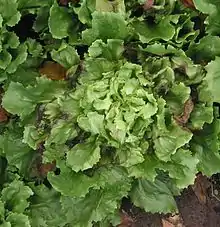endive
English

An endive plant.
Alternative forms
- endyve (obsolete)
Etymology
From Old French endive, from Medieval Latin endivia, from Late Latin intibus, from Byzantine Greek ἔντυβον (éntubon). Ultimately of uncertain origin, indeed perhaps Ancient Greek Τῦβι (Tûbi, “the month of Tybi, roughly January”) from Egyptian tꜣ-ꜥꜣbt (“the month of Tybi”).
Noun
endive (countable and uncountable, plural endives)
- A leafy salad vegetable, Cichorium endivia, which is often confused with common chicory (Cichorium intybus).
- 1915 August 28, Marion Harris Neil, “When Lettus is Scarce”, in The Country Gentleman, volume 80, page 1379:
- Broad leaved, green curled or white curled, the endive plants are good; the green sorts, on account of their coolness and their plentiful salts, are esteemed for the salad bowl, and the white-curled sorts are liked for soups, stews and as boiled vegetables.
Hyponyms
- (Cichorium endivia): curly endive, escarole, frisée lettuce, frisée; broad-leaved endive
Derived terms
- Belgian endive (from Cichorium intybus)
Translations
salad vegetable
|
|
See also
French

Une endive blanche.
Etymology
Pronunciation
- IPA(key): /ɑ̃.div/
Audio (file)
Noun
endive f (plural endives)
- (cooking) Belgian endive (edible chicory bud of Cichorium intybus)
- Synonym: chicon
- Une salade d'endive.
- (please add an English translation of this usage example)
Usage notes
In a strict botanical sense, French endive or English Belgian endive is actually not an endive (of the species Cichorium endivia) but a common chicory (Cichorium intybus)[1].
See also
References
Further reading

- “endive” in le Trésor de la langue française informatisé (The Digitized Treasury of the French Language).
This article is issued from Wiktionary. The text is licensed under Creative Commons - Attribution - Sharealike. Additional terms may apply for the media files.